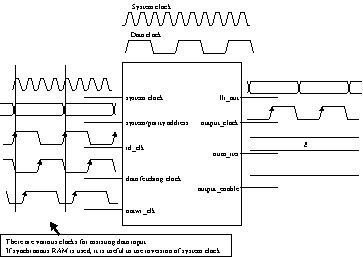|
Release 3GPP Compliant Turbo decoder IP Core (May, 2000)
Release 3GPP Compliant Turbo decoder IP Core (May, 2000)
softDSP released 3GPP compliant Turbo decoder
IP core in May, 2000. We also supply simulation program and C-source code,
designer's guide, test vector, interleaver generation C source code. Powerful
decoding performance and small-size implementation will meet your system
requirements satisfactorily. softDSP Turbo decoder has the feature of easy I/O
interface and used as a slave device controlled by host processor such as ARM
core or any other DSP processor. It is recommended that every other part of 3GPP
FDD blocks except Turbo decoder is implemented by s/w (dsp) for the such
conditions as control oriented feature, easy updating, and development time
reduction.
You may be working on system
performance modeling, system implementation or you may require help with the
implementation of a specific component. We work at all stages of the system
design of channel coding and our expertise together with our hardware or
software implementations will allow you to rapidly achieve your objectives.
Simulation, Modeling
and Hardware design of Forward Error Correcting Code
Our flexible, powerful, bit-accurate
C/C++ models of Viterbi decoder and Turbo decoder enable you to simulate
complete forward error-correction systems. The detailed and precise results will
help you to predict and optimize the performance of your system. Our hardware
design modules and systems are available as reusable Intellectual Property (IP)
components or customized designs, in VHDL. Recently, Turbo decoder satisfying
3GPP standard was developed. The design has been optimized for power and gate
count minimization. It can be applied to various systems as 3GPP, satellite
communication system, magnetic storage channel
softDSP released 3GPP compliant Turbo decoder
IP core in May, 2000. We also supply simulation program and C-source code,
designer's guide, test vector, interleaver generation C source code. Powerful
decoding performance and small-size implementation will meet your system
requirements satisfactorily. softDSP Turbo decoder has the feature of easy I/O
interface and used as a slave device controlled by host processor such as ARM
core or any other DSP processor. It is recommended that every other part of 3GPP
FDD blocks except Turbo decoder is implemented by s/w (dsp) for the such
conditions as control oriented feature, easy updating, and development time
reduction.
You may be working on system
performance modeling, system implementation or you may require help with the
implementation of a specific component. We work at all stages of the system
design of channel coding and our expertise together with our hardware or
software implementations will allow you to rapidly achieve your objectives.
Simulation, Modeling
and Hardware design of FEC.
Our flexible, powerful, bit-accurate
C/C++ models of Viterbi decoder and Turbo decoder enable you to simulate
complete forward error-correction systems. The detailed and precise results will
help you to predict and optimize the performance of your system. Our hardware
design modules and systems are available as reusable Intellectual Property (IP)
components or customized designs, in VHDL. Recently, Turbo decoder satisfying
3GPP standard was developed. The design has been optimized for power and gate
count minimization. It can be applied to various systems as 3GPP, satellite
communication system, magnetic storage channel
softDSP Turbo decoder core
softDSP
Corp. developed Turbo decoder core version 1.2 in May 2000. Powerful new technology
was adopted and it satisfies recent 3GPP standard specification (3GPP 3G TS
25.212 V.3.2.0). The detailed features are as follows.
- Use max-log-MAP decoder as an
internal component decoder which produces better performance than the other
component decoder
- Use sliding-window technology
to reduce internal memory size
- Constraint length K=4 (8-state
with g0=1+D2+D3, g1=1+D+D3), rate 1/2, 1/3
- 4-8 bit soft input (recommend
over 5bit input) with internal 8bit fixed-point processing
- Support 8-level Eb/N0 scaling
- 3GPP compliant (block size 40-5114)
- Easy to use interface, easy to
modify or adapt

Figure. Design timing
diagram of Turbo decoder
3GPP
Channel coding (FDD point of view)
When designing 3GPP baseband modem
systems, such blocks as error detection, block segmentation, rate matching,
and interleaving can be implemented by DSP processor, since DSP has the advantage
in complex control oriented operations, I/O intensive operations, and memory
referencing, and further for the future extension or flexibility, these blocks can be implemented by DSP coding.
But for the case of error correcting
codes, since the encoder standard is fixed and decoder is very computation oriented,
it is advantageous to implement it hardwired. The considering point will be
such point as small gate size, performance, speed, and easy I/O interface. So
easy and independent decoder design is important. To focus these point we developed
and modified our design. By employing max-log-MAP method, reduced computation
complexity without sacrificing the performance. Further, for the features of
rate matching algorithm in 3GPP FDD standard, the information of the front
channel estimator can be inexact, which gives more plausible reasons to select
max-log-MAP method as the best candidate for component decoder of Turbo code.
Also, by employing sliding-window
technology, required memory size was reduced significantly. Comparing with normal MAP decoder
implementation, just about 10% of memory is required. Also, by various and
exhaustive simulation
and design of each blocks, we could make optimally designed code. softDSP turbo decoder core was fully
designed by VHDL code which gives flexibility to ASIC and system design.
Offering
materials
- VHDL source code
- Test C-source code (floating point
and fixed point)
- Interleaver generation routine
C-source (3G TS 25.212 V.3.2.0)
- Test data vector
 | 
